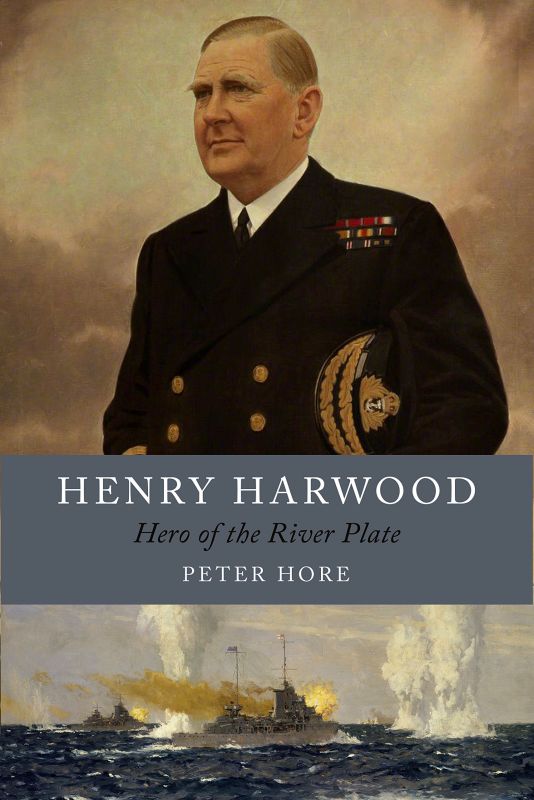| Title: | Henry Harwood - Hero of the River Plate |
| Writer: | Hore, P. |
| Published: | Seaforth Publishing |
| Published in: | 2018 |
| Pages: | 244 |
| Language: | English |
| ISBN: | 9781526725295 |
| Description: |
"Henry Harwood" is the biography of Admiral Harwood who claimed the first significant naval victory of the Second World War against the German Kriegsmarine. These first months of the war were relatively quiet from a military point of view and were therefore called the Phoney War. This Royal Navy victory, in which Henry Harwood played a major role, was very important for the British government and especially for Prime Minister Winston Churchill. The Battle of the River Plate, as Harwood`s fight at sea was called, was of course used for propaganda purposes with a great sense of drama. The Battle of the River Plate was fought by the German pocket battleship Admiral Graf Spee on one side and the British cruiser division of Commodore Harwood on the other. During the battle the British had one heavy and two light cruisers at their disposal and were probably no match for Kapitän zur See Hans Langsdorff, the commander of the German mini battleship. The Admiral Graf Spee was deployed from the first day of the war as a merchant raider and Langsdorff and his men had already sunk eight Allied ships by 13 December 1939. On that same day both opponents met in the River Plate estuary near Montevideo, Uruguay. Soon an artillery duel began, during which the Admiral Graf Spee fired alternately on the British heavy and light cruisers. As a result the heavy cruiser was severely damaged and one of the light cruisers suffered minor damage. But the German ship was damaged as well. Langsdorff decided to enter the port of Montevideo for emergency repairs and to bury his dead. According to the laws of war a ship of a belligerent nation could only stay in a neutral port for the time period of 72 hours. Therefore Henry Harwood decided to patrol the River Plate estuary with his cruisers and to attack the German ship when it set sail again. He had been forced to send his heavily damaged cruiser to the Falkland Islands but within two days another heavy cruiser joined his small fleet. In addition the British led the Germans to believe that many other Royal Navy ships were making their way to the River Plate. Subsequently Langsdorff saw no alternative than taking his crew to safety and then blowing up his own ship after he left port on 17 December. Kapitän zur See Hans Langsdorff committed suicide two days later after taking all responsibility in a letter to the German Ambassador in Buenos Aires.
Commodore Henry Harwood was treated as a hero by both the British government and the Royal Navy. A few years later he was appointed Commander-in-Chief Mediterranean. This turned out to be a very unfortunate moment, because at the beginning of 1942 the Italian Navy (the Regia Marina) and the German Luftwaffe were at their strongest while the Royal Navy was at its weakest in this theatre of war. This was because the British were not supported by the United States yet and therefor the Royal Navy had to be deployed on too many fronts at the same time. Due to the superiority of the Axis Powers the supply of the African Corps could be maintained almost undisturbed so that Erwin Rommel was able to capture some very strategic airfields in North Africa. Bernhard Montgomery was frustrated by this situation and he openly criticised Harwood. In turn Churchill started to have second thoughts about Harwood `s capacities as Commander-in-Chief and in 1943 Harwood was transferred to a strategically less important position. In 1945, Henry Harwood, who was now faced with weak health, resigned from the Royal Navy. Shortly after the war he received unjustified accusations from some historians regarding the shortcomings of the British Navy in the Mediterranean in 1942. Harwood died in 1950 at the relatively young age of 62. The author of "Henry Harwood", Peter Hore, emphasizes in his preface that his biography of Harwood is not just about the Battle of the River Plate, but almost half of the book still consists of his description of the battle. That is not a real problem because Harwood`s fame is unquestionably connected with the famous sea fight at the River Plate. Without this battle Henry Harwood would probably just have remained what he had been before the battle: an excellent staff officer (a well-educated officer who makes plans and calculations, comes up with brilliant strategic ideas and primarily has an advisory role). But because the British gave Harwood so much credit after the Battle of the River Plate, they could not ignore him. As a war hero he had to be promoted. But did Harwood actually win the Battle of the River Plate or had Langsdorff just lost it by spreading his firepower, by failing to sink the British cruisers one by one and by blowing up his own ship instead? Was Harwood suitable as Commander-in-Chief Mediterranean in the first place? Couldn`t he have just been deployed to a staff position? Peter Hore does not answer these important questions. Captain Peter Hore (1944) served from 1962 to 2000 in the Royal Navy. After this long naval career he was active in the film and television industry for ten years. He has been active as an editor and column writer for various British magazines since his retirement and has written dozens of books. But why does such a renowned and respected writer and historian not answer the previously asked questions? Or can he not answer them as an impartial and objective author? One thing is certain though: Peter Hore is the very first author to describe the chapters of Henry Harwood`s career that have unfolded before and after the Battle of the River Plate. This also confirms the statement of publisher Seaforth Publishing (a division of Pen & Sword Books), that Harwood, one of the well-known British naval commanders of World War Two, did not yet have a biography. Peter Hore has been given exclusive access to the Harwood family archives and unpublished documents and letters for writing "Henry Harwood". In this way he discovered that many prejudices and accusations in the period 1942-1943 against his main character cannot be substantiated. With the publication of his book, he restored Henry Harwood to his former glory and indicated that the British flag officer was indeed one of the great war commanders of the Royal Navy, not only in 1939, but also during the remaining part of the Second World War. This conclusion gives the book great historical value and in fact makes it essential literature for anyone interested in the history of the Royal Navy. The fact that the work is also well written and contains sixteen pages of beautiful photographs and clear maps is only a nice bonus. |
| Rating: |     Very Good! Very Good!
|
Information
- Article by:
- Peter Kimenai
- Published on:
- 15-10-2019
- Feedback?
- Send it!



